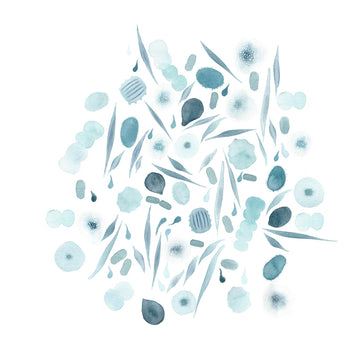Your cart is currently empty.
MICROBIOMIX™
FACT
There are more microorganisms living on one underarm than there are people on this planet.

So What is the Microbiome and Why Should You Care?
A microscope would show you that our skin has its own ecosystem of over 1000 different types of bacteria and other microorganisms living on it. All of those little “friends” make up our microbiome. They serve a very important purpose acting as our first line of defense against pathogens reducing the chance for infections. They also keep the skin barrier intact, protect it from inflammation, balance the pH of the skin, among so many other things. Your microbiome is as unique to you as your DNA.
How Microbiomix™ Works
Did you know that sweat is odorless? Sweating is a natural and necessary process but when it comes into contact with specific bacteria on your skin, it creates a not-so-great odor.
Microbiomix™ is our patent-pending blend of proven ingredients that work with your skin’s microbiome, nurturing the good bacteria and neutralizing the bad, resulting in 24-hour odor protection. It keeps the skin microbiome in balance by:
- Feeding the friendly bacteria with prebiotics to help them thrive
- Adjusting the skin pH to its physiological level with postbiotics
- Deactivating odor-causing bacteria with targeted ingredients
Balance Your Biome
In order for any product you put on your skin to work, it must work in harmony with your skin’s microbiome. Antiperspirants work by blocking pores to prevent sweat and they have a negative impact on the skin microbiome, especially on friendly bacteria. Traditional deodorants work like weapons of mass destruction, wiping out everything, both the good and the bad odor causing bacteria on the skin with antimicrobials and alcohol. Natural deodorants disturb the skin microbiome and the acid mantle with ingredients such as baking soda. Moreover most of those products try to mask body odor with fragrances or essentials oils, which contain allergens and can irritate the skin. By balancing the skin microbiome, Microbiomix™ brings a safe and effective way to prevent body odor.
The More You Know
An imbalance of the microbiome, called dysbiosis, can lead to a variety of skin conditions including acne, eczema, rosacea and even premature ageing. While Americans have never been so clean, those conditions have risen dramatically. For instance, the incidence of atopic dermatitis, also known as eczema, has increased 2- to 3-fold in industrialized nations, impacting approximately 15% to 20% of children and 1% to 3% of adults worldwide.
It was not until about 15 years ago that scientists developed tools allowing them to better tally microbial populations and study how their presence or absence affects human health. The advent of improved and cheaper technology such as next-generation sequencing (NGS) combined with breakthroughs in proteomics and metabolomics have allowed initiatives such as the Human Microbiome Project to identify and quantify thousands of previously unknown microorganisms, totally overlooked by conventional culture methods.
Until recently, unaware of the diversity and role of the skin microbiome, the personal care industry followed a binary approach. Either products were designed to eradicate skin bacteria, targeting those involved in skin disorders but in reality, disturbing good bacteria too, or they did not take into account the skin microbiota. Deodorants were in fact the first products developed to target skin microorganisms, with early studies on the effect of topical antibacterial agents on the axilla in 1963. The most common antibacterial ingredients used in deodorants worldwide are farnesol (24%) and triclosan (8%) but because of major safety concerns, they have gradually been restricted or banned in most countries.
